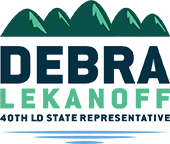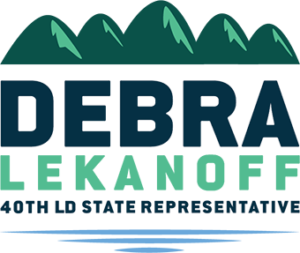Making Space at the Table on Fantastic Friday
Dear Friends,
All of us in Olympia have an amazing role as elected officials. We are blessed to be able to uplift those voices who have not been heard enough, and to stand beside those who have been leading to make space for everyone.
The historical local, state, and federal policy tables were not built for diversity and equity. In my 6 years serving in the state legislature, I have witnessed incredible achievements reflect the call from our constituents. Thinking about committees in the People’s House, I celebrate every time a new Chair that comes from an underrepresented community, sitting at the head of the table where their voice is welcomed with respect by all.
In my own reflections, I see and have experienced the fact that Native Americans are fighting to be survivors and not victims of historical trauma from political policies and actions in our state and national actions.
The reality of our history is always interwoven in the decision-making process. I remember the cultural teachings and values passed down by the elders to the youth who shared their dreams. It is this foundation that guides my vote on the Floor of the People’s House of Representatives.

I serve every day with a memory that these decision-making tables were not built for people who look like me, sound like me, or make decisions like me. Therefore, I serve with a profound responsibility to honor this role for us all. I work to honor those who were not able to pull a chair up to the table, and work to ensure my voice the past and brings a bright future.
Representation matters. In my tenure there have been incredible legislative leaders that have joined in passing historic bills. We have all stepped up to raise the voices of Native Americans in state policy, recognizing and honoring our relationship to their sovereignty and treaties. The vision of strengthening the state, tribal and local governments is one that has been the principal that guides my tenure and one that has been passed down to me from the late Senator John McCoy, known traditionally as “lulitas.”

Everyday is a chance to bring state, tribal, and local governments together to build a better place for all. We can do this in the State of Washington, it just takes each and everyone of us to look around our table and notice who is missing, pull up a chair, and invite them to join all.
Keep reading for more on this Fantastic Friday.
“Stay Safe, Stay Healthy”
Rep. Debra Lekanoff
Pentl’ach Declared a Living Language
Recently we got some incredible news from our brothers and sisters just north of the 40th LD.
In Canada, the pentl’ach language (pronounced “Punt-Lutch”), has been declared a living language and added to British Columbia’s official list of First Nations languages!

The Coast Salish language has been considered dead for nearly a century, as the last known fluent speaker passed away in the 1940s.
This is an incredible achievement, one that was made possible by incredible and passionate individuals with the Qualicum First Nation on Vancouver Island’s east coast. Their work was also supported by the First Peoples’ Cultural Council.

According to CBC, “Jessie Recalma, a cultural language researcher for the project and member of Qualicum First Nation, has been digging through documents and recordings that were made before the 1940s to reconstruct grammar and vocabulary for the language.”
Read more about the process here.
It warmed my heart to see this news. For so long, our languages and cultures were attacked, targeted, often even banned. To see the resurgence of a language once thought lost is incredible, and shows why we must continue investing in those doing the important work to preserve and revive Indigenous language.
The Need to Use Available Resources
Friends, we have talked at great length during my time in Olympia regarding the ongoing Missing and Murdered Indigenous Women and People crisis in this country, and around the world.
It is something that I hold near to my heart, an issue that is always at the top of my list of priorities. We have accomplished so much to help bring our Native sisters and brothers home, including setting up a first of its kind alert system that we have seen replicated in other places.

This issue requires our full attention, and it is vital that we use the resources available to us to address this crisis.
It is with that in mind that I was disappointed to recently learn that almost two years after the state of New Mexico set aside $1 million for the state’s Attorney General’s office to create an online portal to track cases of missing Indigenous people, they still have not spent the money.
Part of their reasoning for not spending the funds was the creation of the FBI database – but other parts of the statute that allocated the funds have not been met, and no grants have gone out to support tribes.
We must take steps like the New Mexico Legislature and address this issue by funding vital programs, but it is equally important that we hold those in charge of using those resources accountable.
It is my hope that the New Mexico Attorney General’s office use these funds soon, taking the next step in helping support our Native communities.
Protecting the Salish Sea
As those who have read my newsletters and followed along with my work in Olympia, ensuring that we protect the natural beauty of Washington for the next seven generations to come has always been a top priority of mine.
Not only do we enjoy the beauty and resources of the Salish Sea, but there are so many creatures that call it home, and it is our responsibility to ensure that their habitats are protected so they may thrive and reproduce, as they have for countless generations.
As we look to next steps that we can take, I am working to ensure that all interested parties – the state and federal government in the United States, the Canadian government, and tribal nations – come together to collaborate and ensure that we take necessary and consistent precautions to protect this beautiful place on earth.
It is so important that we remain consistent in our regulations, ensuring that no matter where a vessel is flagged or whose sovereign waters they sail through, they are required to respect the Salish Sea, and tread carefully for those who call this place home.

As a 2021 report from the Washington State Department of Ecology wrote:
“The Salish Sea, which includes the Strait of Juan de Fuca, the Strait of Georgia, and Puget Sound, is a large and diverse waterbody. A wide variety of commercial, tribal, First Nation, and recreational vessels operate on these waters.
In 2018, nearly 5,000 commercial vessels called on Washington and Canadian ports within the Salish Sea (Washington State Department of Ecology, 2019a). Half of all oil moved in Washington State in 2018, 10 billion gallons, was transported by vessels (Washington State Department of Ecology, 2019b). Commercial and private ferries provide transportation links for passengers, vessels, and cargo in the US and Canada.
The Salish Sea is home to numerous federally recognized tribes and First Nations with treaty reserved aboriginal fishing and hunting rights. Commercial fishing vessels catch multiple species of fin and shellfish. Each year, thousands of people enjoy recreational fishing and boating throughout the Salish Sea.”
Over the years, I have been able to work with fellow legislators, scientists, activists, and more to determine how we can best help the Salish Sea, and what steps we can, and must, take in order to ensure its natural beauty and ecosystems are around for seven generations to come.
Protecting the Salish Sea is very close to my heart, and it’s something that remains a top priority of mine. This natural beauty is home to countless creatures and deserves our love and respect. Thank you to everyone who has made this a priority over the years. Together we will leave a better world for our grandchildren’s grandchildren.
Cold Case Funding Awarded to Washington State
Now some incredible news – we were recently awarded additional funding for Washington’s law enforcement to investigate and prosecute cold cases!
Attorney General Bob Ferguson announced late last month that Washington will partner with tribes across Washington to address cold cases involving Missing and Murdered Indigenous Women and People, dating back more than 40 years.
The funding comes from the Emmett Till Cold Case Investigations and Prosecution Program, and Bob’s office won the largest-ever grant from the program at $1.5 million!

According to a press release:
“The federal Emmett Till Cold Case Investigations and Prosecution Program supports state, local and tribal law enforcement efforts to investigate and prosecute cold cases from before 1980 that involve racially motivated crimes or civil rights violations. Ferguson’s office won $1.5 million, the largest-ever grant from this program.
The Attorney General’s Office originally applied for a $750,000 grant, only to receive double the amount requested. It’s the largest award granted since the Department of Justice launched the program in 2020. Five tribes — Colville, Cowlitz, Puyallup, Spokane and Suquamish — submitted letters of support for the project.
This grant project will support the work of the new Missing and Murdered Indigenous Women and People Cold Case Unit in the Attorney General’s Office. The new unit’s primary purpose is to assist local and tribal law enforcement agencies to solve cases involving Indigenous people. Ferguson recently appointed Brian George, a veteran investigator and member of the Port Gamble S’Klallam Tribe, to lead the unit.”
Read more here.
I am so thankful to have someone like Bob standing up and working to help protect our Indigenous brothers and sisters, and that includes bringing some sense of closure to the families of those we have lost.
This will take a tremendous amount of work, but I am glad to be a part of such an important endeavor. My table is always open, and together we will create a better Washington that protects everyone.
Protect Your Community!
The Centers for Disease Control (CDC) Director Dr. Mandy Cohen recently endorsed the recommendation made by the agency’s committee of outside vaccine experts, approving a new COVID-19 booster shot that is recommended for everyone 12-years and older.
As we move into the Fall and Winter, it is important that we take these steps to protect ourselves and others. Updating our COVID-19 vaccines, and getting annual flu and RSV vaccines, is a strong way that we can help keep ourselves, and those around us, healthy.
Friends, by now we all understand the impact that each of us can have on preventing the spread of COVID-19 to those around us. Getting vaccinated remains the most powerful way that we can protect our communities.
For more information, click here.
Flooding in East Skagit County
Finally, I want to share a quick update on the ongoing flooding of the Skagit River.
This is an incredibly scary time, and I urge you to take every possible precaution if your area is impacted. If you can avoid it, stay away from the flooded areas, and if you or a loved one are at risk you should seek separate shelter as soon as possible.
Here is an update from Skagit County:
“As the Skagit River continues to rise, we anticipate several communities in the county to experience flooding throughout the evening and into tomorrow. We encourage anyone living in low-lying, flood-prone areas to plan and prepare to evacuate if needed. The communities most often affected by floodwaters include:
- Marblemount
- Rockport
- Thunderbird Lane
- Concrete
- Cape Horn
- Birdsview
- Hamilton
- Cockerham
- Lyman
- Day Creek
This list is not exhaustive, and we encourage anyone who has experienced flooding to monitor water levels in their neighborhood and be prepared to leave. If you believe you or your home is at risk, please leave sooner rather than later. The Skagit River is anticipated to reach its’ highest point in Concrete at 10:00 p.m. this evening, December 5, 2023. Rescues at night can be unreliable and unsafe for both law enforcement and the public. Please ensure all your devices are charged if you need to reach out for emergency services.
The Red Cross has established a shelter at Hamilton First Baptist Church, 797 Hamilton Cemetery Rd., Sedro-Woolley, WA, to assist those who have been displaced due to the flood.”
Again, please take every precaution you can. If you are unsure, always err on the safe side and get to safety.
I will keep you all posted as this flooding progresses.



